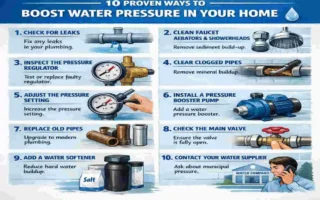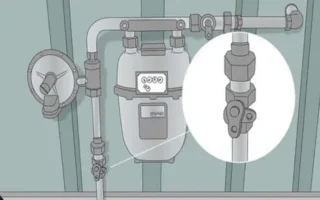If you’re renting a home or apartment, you’ve probably wondered at some point, “Who’s supposed to take care of the plumbing—me or my landlord?” It’s a fair question, and one that can cause a lot of confusion (and sometimes arguments) if not appropriately addressed. That’s why I’m diving deep into this topic today.
Understanding Plumbing in Rental Properties
Before we dive into who’s responsible for what, let’s clarify what “home plumbing” actually means. Simply put, it’s all the systems in your rental that handle water and waste. Think of the pipes running through the walls, the drains in your sinks and showers, the fixtures like faucets and toilets, and even bigger stuff like water heaters. All of these pieces work together to keep water flowing in and out of your home.
Legal Framework: Tenant vs Landlord Plumbing Responsibilities

Alright, let’s get into the nitty-gritty of who’s legally responsible for plumbing issues. The rules around plumbing duties in rental homes aren’t universal—they can vary depending on where you live. However, some common principles apply almost everywhere. Knowing these can help you avoid misunderstandings and maintain fairness.
What Do Landlord-Tenant Laws Say?
Generally, landlord-tenant laws are designed to ensure that rental house properties are safe and livable. For landlords, this means they’re typically responsible for maintaining the major systems in the property, including plumbing. They must ensure the home meets building codes and provides essentials such as running water and proper sanitation. If the plumbing system fails due to age or wear and tear, it’s usually the landlord’s responsibility to fix it.
Landlord Plumbing Duties
So, what exactly falls under landlord plumbing duties? Think big-picture stuff. Landlords are often responsible for ensuring the plumbing infrastructure—pipes, central lines, and water heaters—is in working order. They also need to plumbing issues that affect habitability. For example, if no hot water or a significant leak is flooding the property, the landlord must take immediate action to rectify the situation. It’s their job to keep the rental safe and functional.
Tenant Plumbing Responsibilities
Now, what about tenants? As a renter, your role usually revolves around daily care and proper use. This means using the plumbing systems responsibly—don’t flush things that shouldn’t go down the toilet, and avoid pouring grease down the plumbing sink. You’re also expected to report problems quickly to prevent further damage. In some cases, tenants may be responsible for minor upkeep tasks, such as unclogging a sink with a plunger, but this depends on the specific terms of your lease.
The Role of Local Laws and Lease Agreements
Keep in mind that local laws can get specific about these duties. Some regions require landlords to cover all plumbing repairs, while others place more responsibility on tenants for minor fixes. Please check your local regulations or speak with a legal expert if you’re unsure. Additionally, your lease agreement plays a significant role. It can clearly outline what it is responsible for, so always read it carefully.
Why Does This Matter to You?
Have you ever had a plumbing issue and weren’t sure who to call? Knowing the legal framework helps you act confidently. It also protects you from being unfairly charged for repairs that aren’t your fault. Let’s move on to specific examples of plumbing problems and who typically handles them.
Standard Plumbing Issues Tenants Are Usually Responsible For

Let’s discuss the types of plumbing issues that often fall to tenants to manage. These are typically minor issues related to the use of the rental property. Remember, while laws and leases vary, these are common scenarios where tenant plumbing responsibilities come into play. Let’s break them down.
Clogged Drains from Negligence
One of the most common problems is a clogged drain, especially if it’s caused by an action you’ve taken. Flushing items like wipes, hair, or food scraps down the sink or toilet can create blockages. If the clog is due to misuse, you may be responsible for clearing it or paying for a plumber. It’s a simple rule: if you caused it, you fix it.
Minor Leaks from Usage
Another issue could be minor leaks from faucets or plumbing fixtures, especially if they’re tied to accidental damage. Say you overtighten a handle and it starts dripping—that might be your responsibility to report and possibly cover. These are often minor fixes, but ignoring them can lead to more significant problems.
Prompt Reporting of Issues
Speaking of ignoring things, tenants are almost always expected to report plumbing issues as soon as they become aware of them. Let’s say you notice a clogged drain or a small leak under the sink. Waiting weeks to tell your landlord could turn a minor fix into a major repair. Prompt reporting isn’t just about responsibility—it’s about protecting your home and avoiding liability.
Routine Tasks Tenants Might Handle
In some rentals, tenants are expected to do basic upkeep. Here are a few tasks you might need to take care of:
- Clearing minor sink or toilet clogs using a plunger or drain cleaner (if allowed by your lease).
- Replace faucet aerators or showerheads if they’re worn out due to regular use.
These are often quick and easy, but always check your lease to see what’s expected.
How Misuse Leads to Problems
Misusing plumbing systems can create headaches fast. Pouring grease down the kitchen sink, for instance, can solidify and clog pipes. Flushing non-flushable items can back up the bathroom toilet. These mistakes often mean tenants have to deal with the consequences, either by fixing the issue or paying for repairs. So, how do you avoid this? Be mindful of what goes down your drains! Have you ever experienced a clog or leak in your rental property? How did you handle it? Knowing these common issues can help you stay proactive and keep minor problems from escalating.
Major Plumbing Repairs: Typically the Landlord’s Responsibility
Now, let’s flip the coin and discuss the larger plumbing guide that typically fall under a landlord’s plumbing responsibilities. These are often issues beyond a tenant’s control, tied to the property’s infrastructure or overall condition. Let’s explore what landlords are typically expected to handle.
Burst Pipes and Sewer Line Failures
Imagine waking up to a burst pipe flooding your bathroom or a sewer line backup creating a mess. These are significant issues that landlords are almost always responsible for. Why? Because they’re part of the property’s core systems, they are often caused by aging infrastructure or external factors, not tenant misuse. Landlords must fix these to keep the rental livable.
Water Heater Malfunctions
Another big one is the water heater. If it stops working and you’re left with cold showers, it’s generally the landlord’s job to repair or replace it. Water heaters are expensive and considered essential for habitability, so tenants shouldn’t be expected to cover these costs unless the damage was clearly caused by negligence.
Aging Infrastructure Issues
Plumbing systems don’t last forever. Over time, pipes corrode, joints weaken, and systems fail. If a problem stems from wear and tear or outdated materials, it is the landlord’s responsibility to address it. They’re responsible for maintaining the property’s structural integrity, which includes major plumbing components.
Preventive Maintenance by Landlords

Landlords also have a role in preventing problems before they start. This might include:
- Regular inspections of plumbing systems to catch issues early.
- Servicing water heaters or other equipment to ensure they’re running efficiently.
These steps help avoid emergencies and keep tenants safe and comfortable.
Timely Repairs Are Key
One final point: landlords are typically required to address major plumbing issues promptly. If a broken pipe or sewer issue renders part of the rental unusable, delays could even violate local laws about habitability. If you’re a tenant experiencing a serious problem, don’t hesitate to request a prompt repair.
Have you ever had to wait too long for a landlord to fix a significant plumbing issue? Knowing what’s on their plate can help you advocate for yourself. Next, let’s examine how to ensure everyone’s on the same page from the outset. One of the best ways to avoid confusion about plumbing repairs in rental homes is to get everything in writing. An explicit lease agreement can save both tenants and landlords from headaches down the road. Let’s discuss why this matters and how to ensure your lease covers all the necessary bases.
Why Clear Communication Matters
Firstly, a lease isn’t just a piece of paper—it’s a contract that sets clear expectations. Without specific details about plumbing duties, you might end up arguing over who pays for a clogged drain or a broken pipe. Clear communication upfront builds trust and prevents disputes. It’s a win-win for everyone.
Sample Clauses for Plumbing Duties
Your lease should include clauses that outline the responsibilities of both parties. For example, it might say, “The tenant is responsible for minor plumbing maintenance, such as clearing clogs caused by misuse, while the landlord will handle major repairs like pipe replacements.” Another clause could address reporting: “Tenants must notify the landlord of home plumbing issues within 48 hours of discovery.” These specifics leave little room for misunderstanding.
Tips for Landlords and Property Managers

If you’re a landlord, be proactive. Spell out what tenants plumbing responsibilities need to do and what you’ll cover. Consider providing a list of dos and don’ts for plumbing use in the lease or a welcome packet. And always encourage tenants to report issues right away—it’s better for you in the long run.
Advice for Tenants
As a tenant, don’t just sign a lease without reading it. If the plumbing responsibilities are unclear, ask questions to clarify them. You can even negotiate terms before signing. For instance, if you’re worried about covering minor fixes, see if the landlord will include a clause for shared costs on minor repairs. It never hurts to ask. Have you checked your lease lately? If not, now’s a great time to dig it out and see what it says about plumbing tips. Clear agreements are your best defense against unexpected bills or disagreements.




